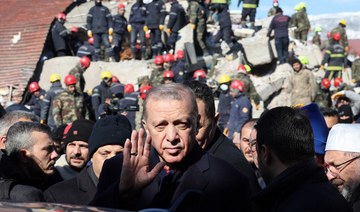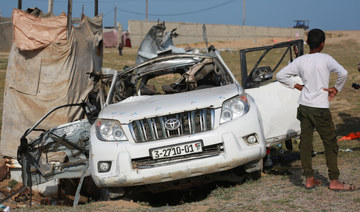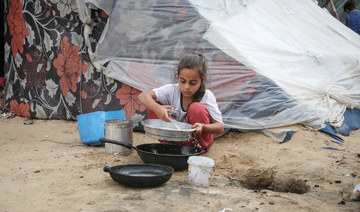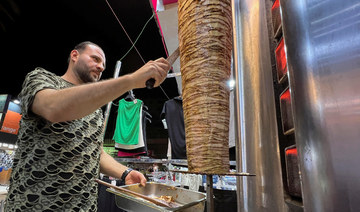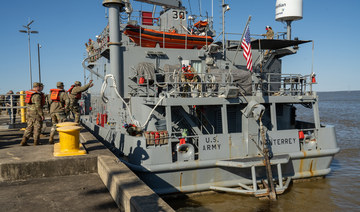JINDERIS: Turkish President Recep Tayyip Erdogan has announced that 35,418 people have died as a result of last week’s quakes, making the deadliest such disaster since the country’s founding 100 years ago.
The massive Erzincan earthquake in 1939 resulted in the deaths of around 33,000 people.
Erdogan said there had been 105,505 people injured as a result of the Feb. 6 quakes centered around Kahramanmaras.
Erdogan was speaking in Ankara following a five-hour Cabinet meeting held at the headquarters of disaster agency AFAD.
Aid agencies and governments stepped up efforts Tuesday to get help to earthquake-devastated parts of Turkiye and Syria, but a week after the disaster many of those left homeless were still struggling to meet basic needs, like finding shelter from the bitter cold.
The situation was particularly desperate in Syria, where a 12-year civil war has complicated relief efforts and meant days of wrangling over how to even move aid into the country, let alone distribute it. Some people there said they have received nothing. In Turkiye, meanwhile, families huddled in train cars.
On Tuesday, the United Nations launched a $397 million appeal to provide “desperately needed, life-saving relief for nearly 5 million Syrians” for three months. It came a day after the global body announced a deal with Damascus to deliver UN aid through two more border crossings from Turkiye to rebel-held areas of northwest Syria — but the needs remained enormous.
Ahmed Ismail Suleiman set up a shelter of blankets outside his damaged house in the town of Jinderis, one of the worst-hit communities in northwest Syria. He was afraid to move his family back into a house that might not be structurally sound, so 18 people slept outside under the makeshift tent.
“We sit but can’t sleep lying down here,” he said. “We are waiting for a proper tent.”
Mahmoud Haffar, head of the town council, said residents have been able to scrounge up about 2,500 tents so far, but some 1,500 families still remain without shelter — as nighttime temperatures fall to around minus 4 degrees Celsius (26 degrees Fahrenheit).
“We are on day nine and we are still hearing the question of when will aid get in,” said Haffar.
While tents have been in short supply, one women said the town had a surplus of donated bread and water.
To the southwest, in government-held Latakia, Raeefa Breemo said only those packing into shelters seemed to be getting aid.
“We need to eat, we need to drink, we need to survive. Our jobs, our lives, everything have stopped,” Breemo said.
Offers of help — from rescue crews and doctors to generators and food — have come from around the world, but the needs remain immense after the magnitude 7.8 quake and powerful aftershocks toppled or damaged tens of thousands of buildings, destroyed roads and closed airports for a time. The quake affected 10 provinces in Turkiye that are home to some 13.5 million people, as well as a large area in northwest Syria that is home to millions.
Much of the water system in the quake-hit region was not working, and Turkiye’s health minister said samples from dozens of points of the system showed the water was unsuitable to drink.
In the Turkish port city of Iskenderun, displaced families have sheltered in train carriages since last week.
While many have left in recent days for nearby camps or other parts of Turkiye, dozens of people were still living in the trains on Tuesday.
“The wagons have become our home,” 50-year-old Nida Karahan told Anadolu Agency.
While a first Saudi aid plane, carrying 35 tons of food, landed in Syrian government-held Aleppo on Tuesday, getting aid to the country’s rebel-held Idlib has been especially complicated.
Until Monday’s deal between the UN and the Syrian government of President Bashar Assad, the global body had only been allowed to deliver aid to the area through a single border crossing with Turkiye, or via government territory.
The newly opened crossings at Bab Al-Salameh and Al Raée are to function for an initial period of three months. Russia bristled at suggestions that the opening of the crossings might be made permanent, and its Foreign Ministry accused the West of trying to get aid “exclusively” to areas not controlled by the Syrian government.
Major humanitarian organizations welcomed the development but cautioned that logistical problems remain, even as the first UN aid convoy with 11 trucks entered northwestern Syria through Bab Al-Salameh Tuesday.
“This is a constant back and forth in negotiations,” said World Health Organization spokesman Christian Lindmeier. “Every party has to agree to receive convoys.”
Meanwhile, the death toll surpassed 35,500 — nearly 32,000 of those in Turkiye. In Syria, the toll in the northwestern rebel-held region has passed 2,200, according to the rescue group known as the White Helmets. Over 1,400 people have died in government-held areas, according to the Syrian Health Ministry.
The toll is nearly certain to rise as search teams turn up more bodies — and the window for finding survivors was closing.
Nevertheless, more than 200 hours after the quake struck, teacher Emine Akgul was pulled from an apartment building in Antakya by a mining search and rescue team, Turkiye’s state-run Anadolu news agency reported.
In Adiyaman province, rescuers reached 18-year-old Muhammed Cafer Cetin, and medics gave him an IV with fluids before attempting a dangerous extraction from a building that crumbled further as rescuers were working. Medics fitted him with a neck brace and he was carted away on a stretcher with an oxygen mask, Turkish TV showed.
Many in Turkiye have blamed faulty construction for the vast devastation, and authorities continued targeting contractors allegedly linked with buildings that collapsed. Turkiye has introduced construction codes that meet earthquake-engineering standards, but experts say the codes are rarely enforced.
At a temporary shelter in a sports center in Afrin in northwest Syria, 190 families were sleeping on the floor of a basketball court, lying on mats typically used for training. The families attempted to create a semblance of privacy by hanging blankets on columns or sports bars.
Sabah el Khodr said she and her two toddlers have been sick for the last nine days. The children were wrapped in blankets and sleeping on the floor of the court.
Local officials said the shelter is temporary, until new tents are secured.
Erdogan: Earthquake deaths worst in Turkiye’s modern history
https://arab.news/n9r68
Erdogan: Earthquake deaths worst in Turkiye’s modern history
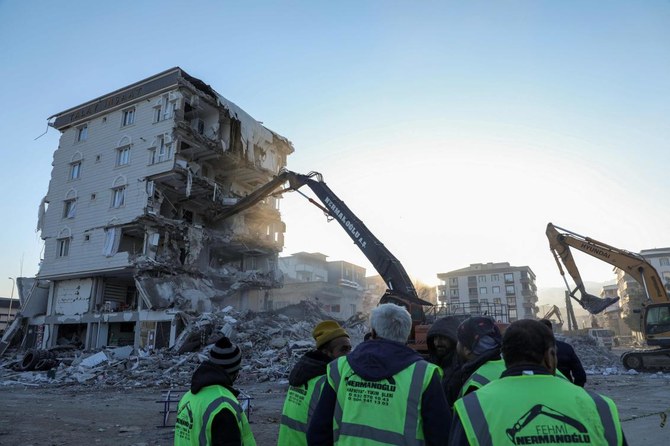
- The massive Erzincan earthquake in 1939 resulted in the deaths of around 33,000 people
- Erdogan said there had been 105,505 people injured as a result of the Feb. 6 quakes centered around Kahramanmaras
UAE field hospital in Gaza provides prosthetics for wounded Palestinians
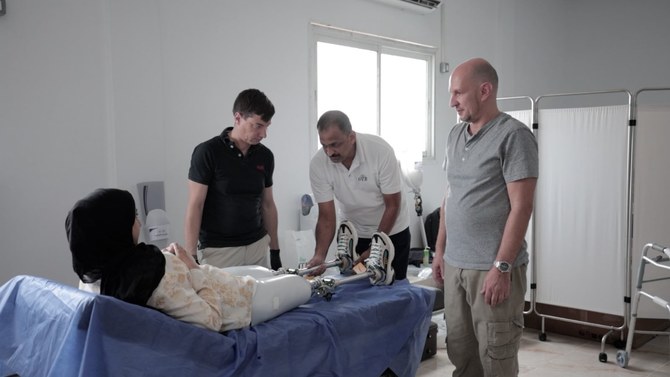
- The hospital revealed plans to distribute 61 prosthetics to wounded people over several phases
RIYADH: The UAE field hospital in Gaza has begun the process of fitting prosthetics for individuals who lost limbs during Israel’s war on the encalve, Emirates News Agency reported on Sunday.
The hospital revealed plans to distribute 61 prosthetics to wounded people over several phases, with each phase accommodating 10 individuals for the fitting process, coupled with physical and psychological rehabilitation support.
Established last December, the UAE field hospital in Gaza boasts a capacity of 200 beds and operates with a medical team comprising 98 volunteers from 23 different countries, including 73 men and 25 women.
Since then, the hospital has conducted a total of 1,517 major and minor surgeries, catering to over 18,000 cases necessitating medical intervention.
Their services range from initial first aid to life-saving surgeries, provision of essential treatments and medications, intensive care, and ongoing medical consultations and support.
Blinken to visit Israel, Jordan on new Mideast trip
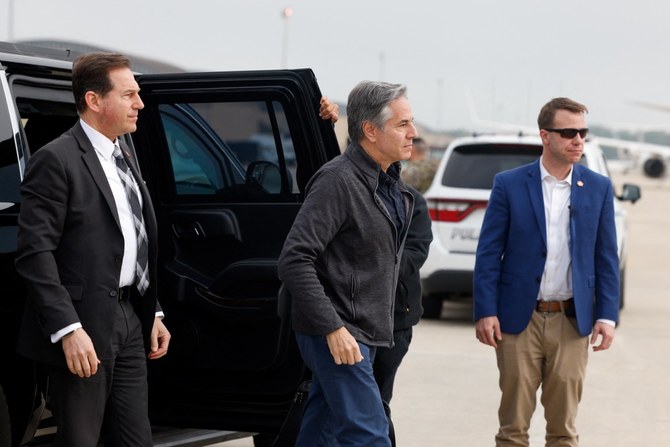
SHANNON, Ireland: US Secretary of State Antony Blinken will visit Israel and Jordan on a trip through Wednesday, the State Department announced, after the US and Israeli leaders discussed hostage-release talks.
Blinken will travel to both countries, a State Department official confirmed as the top US diplomat refueled Sunday in Ireland.
The trip was announced after President Joe Biden and Israeli Prime Minister Benjamin Netanyahu spoke by telephone about ongoing talks to halt Israel’s offensive in the Gaza Strip in return for the release of hostages.
Egypt, Qatar and the United States have been trying to mediate a new truce between Israel and Hamas for months, as public pressure mounts for a deal.
Biden also reiterated concerns about Israel launching an operation in Rafah, the southern Gaza city where more than one million Palestinians have taken shelter.
The State Department did not immediately announce details of the two stops.
Migrants eyeing Europe bide their time in Tunisia
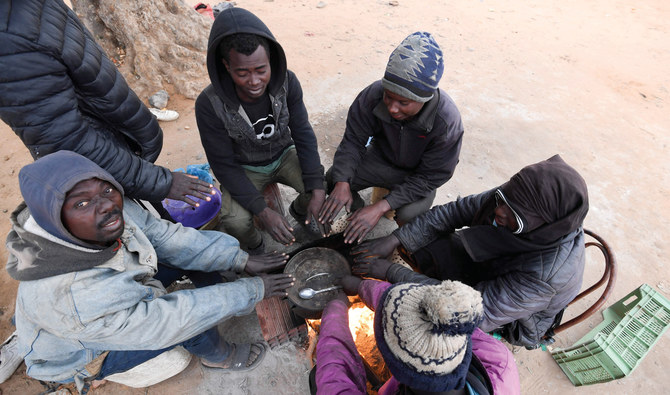
EL-AMRA: Thousands of sub-Saharan migrants have huddled in Tunisian olive groves for months, living in makeshift tents and surviving on meager rations while keeping their hopes alive of reaching Europe.
Around 20,000 are in isolated areas near the towns of El-Amra and Jebeniana, some 30 and 40 kilometers north of the port city of Sfax, humanitarian sources say.
Sfax is one of Tunisia’s main departure points for irregular migration to Europe by boat, and was once a hub for sub-Saharan migrants.
After being forcibly removed from the city last autumn, migrants set up camp in neighboring towns as they awaited their chance to make the perilous crossing.
One weary 17-year-old calling himself Ibrahim said he had left Guinea more than a year ago, hoping to reach the other side of the Mediterranean “to provide for his sick mother and little brother” back home.
He said that after walking for three weeks from the border with Algeria, he arrived in El-Amra in midwinter, about three months ago.
“It’s really difficult here,” he said, adding that he and other migrants feel trapped on the sidelines of society.
“Even shopping, we have to do it in secret ... You can go out looking for work, but when it’s time for your employer to pay you, they would call the police,” he said.
Last year, anti-migrant violence broke out and hundreds of sub-Saharan Africans were kicked out of their jobs and homes.
Tens of thousands embarked from Sfax in 2023 because of its proximity to Italy, the closest European country.
“We are only a few kilometers from Europe,” said Ibrahim of Lampedusa island some 150 kilometers away.
Near El-Amra, in tents made of tarpaulins and rods, groups of five — and at times even 10 — share the same sleeping space.
Men, women and children, mostly from Cameroon, Guinea, Nigeria, Senegal, Sierra Leone and Sudan, congregate by language.
The women cook stew as men remove the feathers of inedible-looking yet indispensable bony chickens.
The winter “was very cold, but we managed to survive thanks to the solidarity we have as African brothers,” said Ibrahim.
“If someone has food and you don’t, they give you some,” he said.
“We bought the tarpaulins with our money,” which relatives managed to send them, “or by begging.”
Some 7,000 migrants received their first food aid in months from NGOs earlier in April, but they said this was not enough and called for more help from Europe, which has ramped up measures aiming to curb irregular migration.
According to Romdhane Ben Amor, spokesman of the Tunisian NGO FTDES, the North African country “is turning into a de facto detention center because of border control agreements signed with the EU.”
Hygiene is a pressing concern at the encampments. “There have been many births and sicknesses,” said Ibrahim.
One humanitarian source said there had been one migrant birth per day in recent weeks at a hospital in Jebeniana.
Salima, 17, said she had no diapers for her four-month-old baby and had to use plastic bags instead.
While awaiting the resumption of departures for Europe, delayed because of bad weather, Salima said she was still determined to make the crossing.
Tunisian authorities raided several encampments recently, tearing down tents and kicking out some migrants, after locals allegedly reported thefts.
Near Jebeniana, journalists saw used tear gas canisters, bulldozers and destroyed tents — some of which were already being put back up.
“We’re very tired of the police,” said 22-year-old Sokoto — also a pseudonym — who left Guinea three years ago and entered from Algeria last January.
“Just yesterday, I was chased from shops” in the town of El-Amra, he said.
Mohamed Bekri, a resident of El-Amra, said he often brings food and water to the migrants for “humanitarian” reasons.
“There are babies who are three and six months old,” he said.
Despite the tensions and the dire situation the migrants find themselves in, none of those interviewed said they wanted to return to their countries of origin.
“The reverse gear is broken,” said Sokoto. “I left to help my family and I suffered a lot to get here.”
Puppet maker turns tins into toys in ruins of war
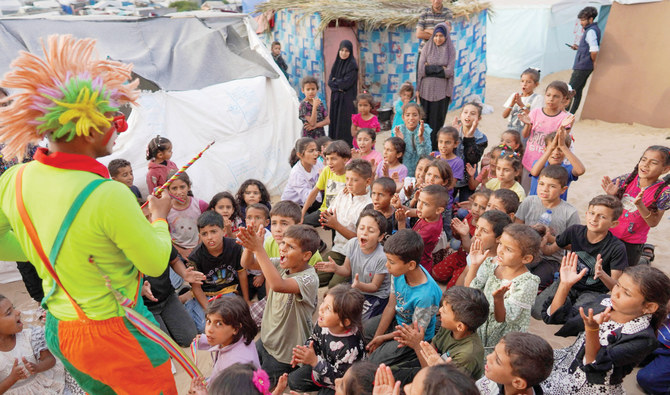
DEIR AL-BALAH: On a cinder block work table in the war-torn Gaza Strip, puppet maker Mahdi Karira is busy turning old tin cans into figurines.
He hums as he works, knowing his makeshift marionettes will put a smile on the faces of children displaced by the more than six-month war in the coastal Palestinian territory.
“These puppets can make things around us beautiful,” he said, surveying his handiwork.
Before the war, Karira had a large collection of brightly colored puppets, often taking them to perform in theaters.
Now, he performs in camps for displaced people after Israeli bombardment forced him to flee his home in Gaza City to Deir Al-Balah, in the center of the narrow strip.
Several puppets are suspended along the workshop walls.
Their bodies are topped by expressive human faces carved onto wood or tin cans, and their limbs are hooked to strings that Karira uses to make them walk and talk.
With Gaza under siege, new materials are hard to come by, so he makes do with debris, fishing lines, and old sardine tins stamped with the UN logo, which he brings to life with a touch of paint.
“Unfortunately, after the displacement, there were no more puppets, no more theater,” he said.
“I left all my work in Gaza City,” in the territory’s north.
“There are not many raw materials to work with — only cans of all shapes and sizes around us.”
UNICEF, the UN children’s agency, estimates the war in Gaza has displaced around 850,000 children in Gaza.
Many are sheltering in camps around Deir Al-Balah, where childhood fun is a distant memory.
“I try to make shows and performances to bring joy to the children in the displacement camps, so we remain steadfast on this earth despite the aggressions,” Karira said about Israel’s air and ground campaign in Gaza, sitting beside his pliers and a painted puppet head.
Karina said keeping up his craft as the war rumbled around him was vital.
“The most important thing is to remain faithful to your work by creating your art,” he said.
“Each of us has his trade, talents, and art that allows him to continue to have an activity despite the aggression.”
The territory’s cultural heritage has been devastated — from art centers and museums to historic buildings.
As he watches Gaza reduced to rubble, Karira said the puppets “can tell beautiful things, tell our history and stories to children.”
Gaza aid pier ready in two to three weeks: US
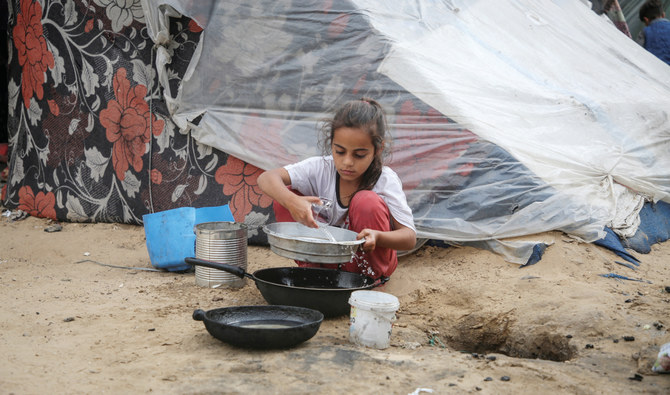
- Israel faces growing pressure to enable more aid deliveries as the UN warns famine is imminent
WASHINGTON: The White House said on Sunday that a US-made pier meant to boost aid to Gaza would become operational in a few weeks but cannot replace land routes with trucks as the best way to feed people in the territory.
Israel’s more than six-month war against Hamas in Gaza has triggered a humanitarian crisis, and it faces growing pressure to enable more aid deliveries as the UN warns famine is imminent.
The Pentagon said last week that the US military had begun building a pier to speed up aid deliveries.
“It will take probably two to three weeks before we can see an operation,” White House national security spokesman John Kirby said Sunday on ABC News.
Kirby said the floating platform to bring more food and other essentials to Gaza will help, but it has limits.
“Nothing can replace, quite frankly, the ground routes and the trucks that are getting in,” Kirby said.
After the killing of seven aid workers in an Israel strike on April 1, which drew international outrage, President Joe Biden bluntly told Israel to change the way it is waging the war.
He said it was imperative that Israel let in more aid and take more pains to avoid Palestinian civilian casualties.
Biden said continued US aid to Israel would depend on such changes being made.
Kirby said Israel is now, in fact, letting in more trucks, including in the particularly hard-hit north of Gaza.
“The Israelis have started to meet the commitments President Biden asked them to meet,” he said.
Plans for the pier were first announced by President Biden in early March, as Israel was being accused of holding up aid deliveries on land.
Kirby also said Israel had agreed to listen to US concerns and thoughts before it launched an invasion of the border city of Rafah in Gaza.
“They’ve assured us that they won’t go into Rafah until we’ve had a chance to really share our perspectives and concerns with them,” Kirby told ABC.
US Secretary of State Antony Blinken is due to visit the region next week and Kirby said he would continue pressing for a temporary ceasefire that Washington wants to last for at least six weeks.
A Hamas official said a delegation will visit Cairo on Monday for talks to secure a ceasefire.



